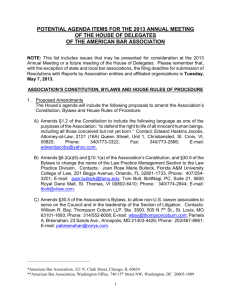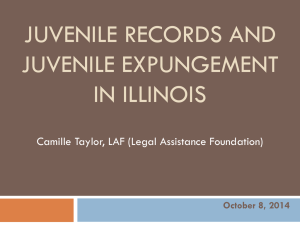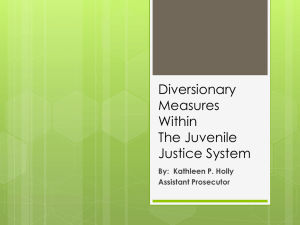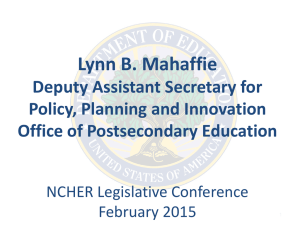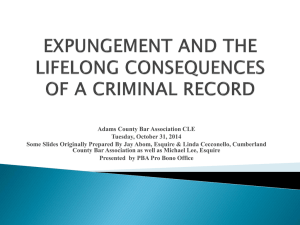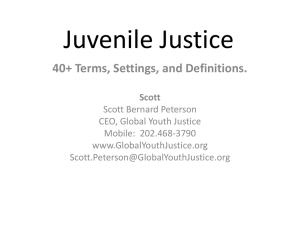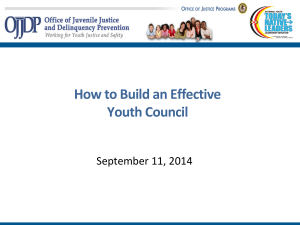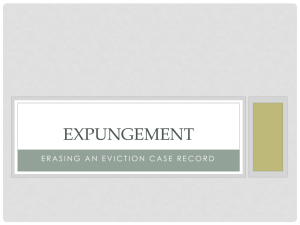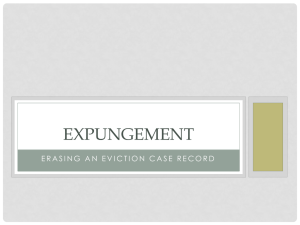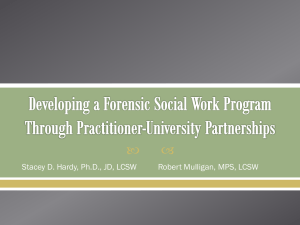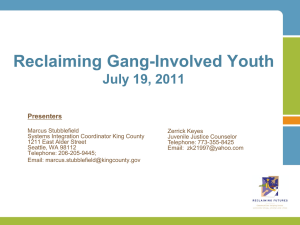Juvenile Records - American Bar Association
advertisement
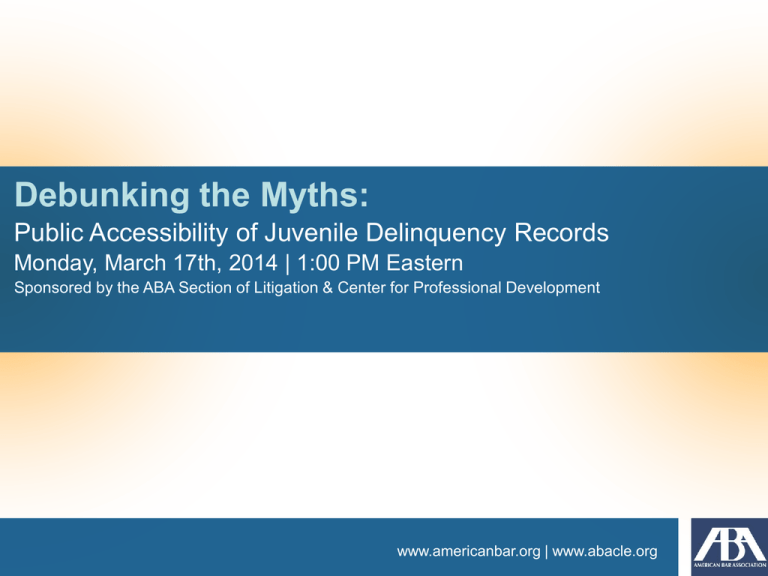
Debunking the Myths: Public Accessibility of Juvenile Delinquency Records Monday, March 17th, 2014 | 1:00 PM Eastern Sponsored by the ABA Section of Litigation & Center for Professional Development www.americanbar.org | www.abacle.org Speakers • Brent Pattison, Assistant Clinical Professor of Law and Director of the Middleton Children’s Rights Center at Drake University Law School, Moderator brent.pattison@drake.edu • Riya Shah, Staff Attorney, Juvenile Law Center rshah@jlc.org • Kim Ambrose, Senior Lecturer and Director, Race and Justice Clinic, University of Washington School of Law kambrose@uw.edu • Sharlyn Grace, VISTA Attorney, Children and Families Practice Group, LAF, Chicago sgrace@lafchicago.org www.americanbar.org | www.abacle.org Juvenile Records – A Historical Perspective 1899 – First Juvenile Court To spare juveniles from harsh proceedings of adult court, punitive and unseemly conditions of adult jails and penitentiaries, and the stigma of being branded “criminal” www.americanbar.org | www.abacle.org Juvenile Records – A Historical Perspective 1980s-90s - Criminalization www.americanbar.org | www.abacle.org Common Vocabulary Limited Accessibility • Sealing • Setting aside No Accessibility • Expungement • Destruction www.americanbar.org | www.abacle.org Why Records Exist • Community protection • Track criminal behavior patterns • Provide for appropriate levels of supervision www.americanbar.org | www.abacle.org Why Expunge Records? • • • • Utility diminishes over time Incorrect information in records Fails to appreciate adolescence is transient Collateral Consequences www.americanbar.org | www.abacle.org Military Housing Subsequent court involvement Education Employment www.americanbar.org | www.abacle.org How do juvenile records affect people?* May be asked to disclose a juvenile record for: • College applications • Job applications May show up on background checks for: • Jobs and professional licenses (teaching, nursing, banking, private security, other jobs [unlawfully]) • Access to Public/Subsidized Housing • TANF benefits • Immigration/citizenship applications – discretionary factors Police Harassment *Impact varies by state law and status of record (sealed, expunged, etc.). www.americanbar.org | www.abacle.org Racial Disproportionality www.americanbar.org | www.abacle.org Racial Disproportionality Consideration – Insufficient efforts to identify and develop permanency resources for youth Strategy: Request specificity on record and in court order of agency’s Reasonable Efforts. Seek “No Reasonable Efforts” finding requiring the agency to continue to seek a more appropriate permanency plan Consideration – Youth may wish to remain in foster care Strategy: Work with youth to develop permanent connections. Engage “permanent connection” in youth’s transition process and foster care case. www.americanbar.org | www.abacle.org Where do Records Live? Courthouse Juvenile Prison System Private companies Adjudication State and Local Law Enforcement Internet FBI www.americanbar.org | www.abacle.org 50 Different Systems • Are juvenile court records stored in a different database from adult records? • Are arrest records linked to juvenile court records? • Are other agencies storing and/or releasing juvenile records? • Are juvenile court records released to commercial data aggregators? www.americanbar.org | www.abacle.org Accessing Records www.americanbar.org | www.abacle.org Who Sees a Juvenile Record? Law Enforcement Courts (if court record) Federal Government – Military – Immigration officials Potential Employers –Legally –Illegally www.americanbar.org | www.abacle.org Advocates for Public Juvenile Records • Open Government Advocates: open courts=open records=accountability • Newspapers/Media: want quick and inexpensive access to information • Landlord Associations: want efficient filtering mechanism for tenants • Prosecutors: Some prosecutors believe it is a deterrent, want to use it for future decisionmaking, believe public has a “right to know.” www.americanbar.org | www.abacle.org Sealing and Expungement Policies and Programs www.americanbar.org | www.abacle.org Automatic Sealing • AK: upon discharge from court supervision, all records of delinquency are sealed • DE: access to sealed records limited to law enforcement for purposes of identifying whether individual is eligible for “first-time offender” program Automatic expungement • CA: after 5 years, court automatically orders expungement if no subsequent court involvement • MS: court expunges records of diverted cases at discharge Expungement by application • PA: Petition at any time after case discharged • IN: Both sides present evidence and court determines after a hearing www.americanbar.org | www.abacle.org Who Sees Records After Expungement?* Court Officers (only if charged again) Law enforcement (only if applying as employee) Federal Government – Military – Immigration officials No Other Employers *Based on the Illinois juvenile expungement process. www.americanbar.org | www.abacle.org Reducing Barriers • In Washington, 10 years of slow progress in the legislature. This year: HB 1651. • Legislation vs. Court Rules vs. administrative policy. – Advocating for friendlier court rules – Advocating within the administrative office of the courts on their policies regarding electronic distribution of juvenile records. – Advocating for resources to public defenders for sealing records. www.americanbar.org | www.abacle.org JUDICIAL INFORMATION SYSTEM DATA DISSEMINATION POLICY • (New) VI. LIMITATION ON DISSEMINATION OF JUVENILE OFFENDER COURT RECORDS • The dissemination of juvenile offender court records maintained in the Judicial Information System shall be limited as follows: – 1. The Administrative Office of the Courts shall not electronically transfer to a licensee by means of file transfer protocol any information from the official juvenile offender court file that is in a single data file that contains information from more than one file or more than one court except for research purposes as permitted by statute or court rule. – 2. The Administrative Office of the Courts shall not display any information from an official juvenile offender court file on a publiclyaccessible website that is a statewide index of court cases unless the entire official juvenile offender court file maintained in the judicial information is available on the website. www.americanbar.org | www.abacle.org Michigan • 3 misdemeanors instead of 1 expunged per year • Eligibility when case closed 1 year instead of 5 years • 1 felony expunged per year Pennsylvania • Summary offenses expunged after 6 months rather than 5 years • Petition at any age with DA consent www.americanbar.org | www.abacle.org Positive Efforts Illinois Efforts to Increase Juvenile Expungement Petitions: 1. Court-based Help Desk 2. Outreach and Education 3. Pro Bono Involvement a. Expungement Clinics at Alternative High Schools: Bring the lawyers to the school! b. Clerk’s summits 4. Collaboration www.americanbar.org | www.abacle.org Common Misperceptions Young people I talk to often think: –No “record” for mere arrests; –No “record” if not found guilty; –Juvenile records automatically disappear at age 18; –No one can see juvenile records; –Serious offenses can’t be expunged; and –The expungement process is expensive. www.americanbar.org | www.abacle.org Collaboration: www.americanbar.org | www.abacle.org Collaboration and Peer Education: Expunge.io www.americanbar.org | www.abacle.org Collaboration and Peer Education: Expunge.io www.americanbar.org | www.abacle.org Pro Bono Projects • The Need: In 2012, over 14,000 juvenile cases were filed in Washington State, each creating a court record. • Building awareness: Thousands of individuals do not know that their juvenile criminal history will affect them until it is too late. • Self-help and Clinics: TeamChild Juvenile Records Sealing Clinic and Resources www.americanbar.org | www.abacle.org Questions? • Brent Pattison, Assistant Clinical Professor of Law and Director of the Middleton Children’s Rights Center at Drake University Law School, Moderator brent.pattison@drake.edu • Riya Shah, Staff Attorney, Juvenile Law Center rshah@jlc.org • Kim Ambrose, Senior Lecturer and Director, Race and Justice Clinic, University of Washington School of Law kambrose@uw.edu • Sharlyn Grace, VISTA Attorney, Children and Families Practice Group, LAF, Chicago sgrace@lafchicago.org www.americanbar.org | www.abacle.org
